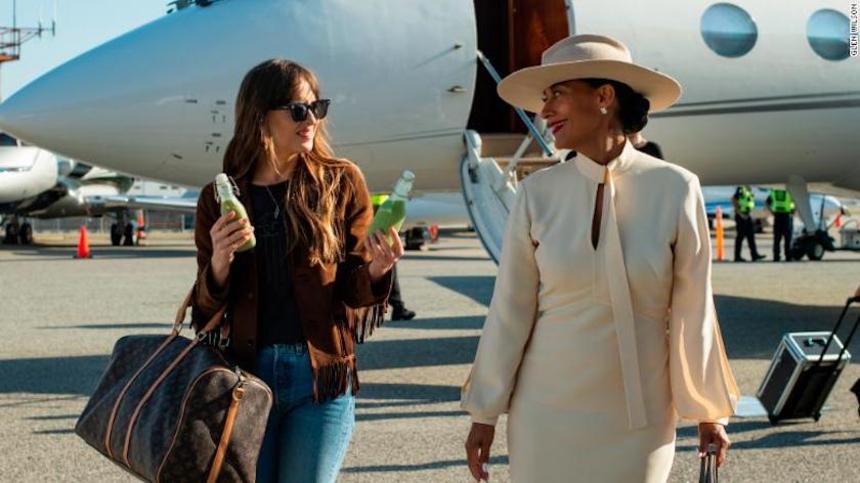Review: THE HIGH NOTE Delivers Familiar Emotional and Musical Beats
Tracee Ellis Ross and Dakota Johnson star in Nisha Ganatra’s music-themed comedy-drama.

Pre-pandemic (the “Before Times”), director Nisha Ganatra’s (Transparent, Late Night, Chutney Popcorn) adaptation of Flora Greeson’s 2018 Black List script, The High Note (originally Covers), was all set for an early May release in multiplexes everywhere, counter-programming for any number of now delayed Hollywood, superhero-themed blockbusters.
But the pandemic changed everything, forcing The High Note’s distributor, Focus Features, to either wait out still-closed movie theaters through the end of summer or release The High Note via other means (e.g., VOD). They chose the latter, hoping to take advantage of stay-at-home families eager for distractions of the escapist entertainment kind like The High Note, a well-made, if ultimately forgettable, pop-musical fantasy/comedy-drama.
In a narrative centered on a mega-diva, Grace Davis (Tracee Ellis Ross) - inspired by innumerable performers, from Diana Ross (Tracee’s mother) to and through Beyonce - and personal assistant/wannabe music producer, Maggie Greenwood (Dakota Johnson, a second-generation performer on her father’s side and a third-generation actor on her mother’s), there’s more than a hint or whiff of white privilege or entitlement.
Maggie has certainly paid her “dues,” working long hours, including weekends, for low pay and little recognition, but as Grace rightly points out, Maggie sees her day job strictly in terms of what it can do for her and her still non-existent career. Maggie expects that three years of sacrifice, combined with her vast musical knowledge and a carefully cultivated ear for music production, will lead, inevitably, to success. It’s less about hope, dreams, or expectations than simple entitlement.
To that end, Maggie doesn’t see a problem in retooling Grace’s hits into an all-new, supposedly fresh “greatest hits” remix. She’s slapped down for her hubris, of course, both by Grace and Grace’s perpetually anxious, constipated manager, Jack Robertson (Ice Cube), but Maggie shrugs it off, later deciding to upend Grace’s record release party by substituting one opening act, Dan Deakins (Eddie Izzard), with her own, David Cliff (Kelvin Harrison Jr.), a musician/romantic interest who Maggie takes under her producing wing under false pretenses - enter the usual rom-com Big Lie that will play a key part in the third act when everyone comes clean - and also hesitantly romances despite a stated desire to put her career first and her personal life second.
All of Maggie’s missteps, however, aren’t meant to be seen or perceived as arrogant or self-centered but done selflessly out of a romanticized, socially acceptable obsession, if not for Grace or David, then for the music that’s defined her life from an early age thanks to her radio DJ father, Max (Bill Pullman, in the equivalent of an overextended, late-film cameo).
That leaves Grace - and, more importantly, Ross - often pushed into the background or the sidelines, ignored by a screenplay that’s more interested in Maggie’s personal and professional journey than Grace’s midlife/mid-career crisis. Greeson’s script lightly touches on ageism inside the music industry, poking fun at the clueless millennial staff of Grace’s current label in one, particularly unfunny scene, and outside the label’s offices, as Grace’s fans, like Grace herself, inevitably age out of music fandom, including record-buying and concert-going.
Throughout The High Note, Grace faces a conundrum: Take the easy money and a long-term gig by agreeing to a multi-year Las Vegas residency or, ten years after her last album of original music, go back into the recording studio and attempt to recreate the musical magic she might have lost along the way. As always, The High Note opts for the more crowd-pleasing choice (rather than a third choice, both), but there’s little suspense given the audience knows what Grace will choose long before she actually does.
A musical comedy-drama set inside the music industry either has to rely on old hits repurposed for the big screen or an all-new set of songs. The former may be easier and less risky, if more expensive (rights issues/payment), but the latter can be more rewarding artistically and commercially all-around.
Credit to The High Note’s producers that they went with the second choice, starting with Grace’s signature female empowerment song, “Bad Girl,” through the rollicking, “Stop for a Minute,” and “Love Myself,” the self-affirmation ballad that closes out The High Note dramatically, emotionally, and thematically. David gets a few songs of his own (“Track 8,” “Chemistry”), one or two covers (“Let’s Stay Together,” “You Send Me”), though the original songs written for David tend to be more rock-oriented and not surprisingly, far less earworm-worthy than Grace’s pop songs.
The film is now available to watch on various VOD platforms, via Focus Features.







